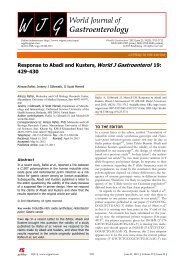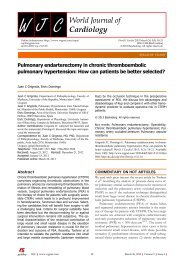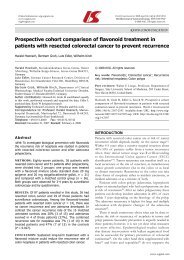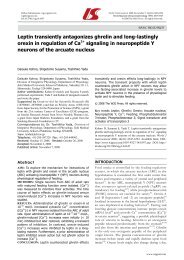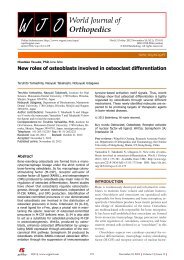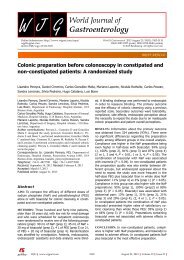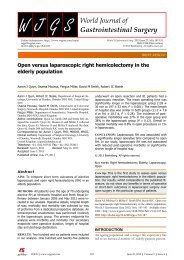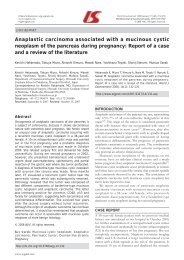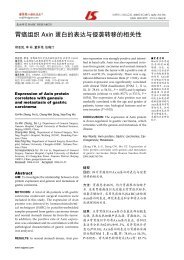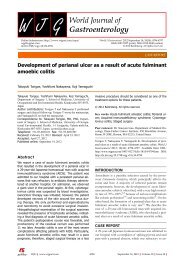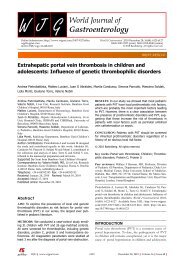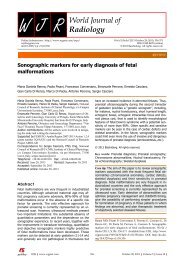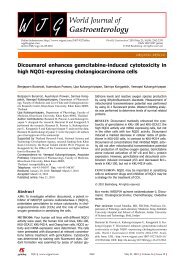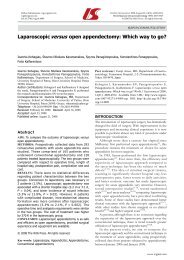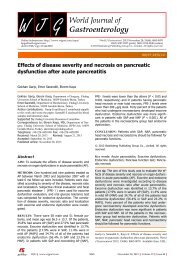Ghrelin's second life - World Journal of Gastroenterology
Ghrelin's second life - World Journal of Gastroenterology
Ghrelin's second life - World Journal of Gastroenterology
You also want an ePaper? Increase the reach of your titles
YUMPU automatically turns print PDFs into web optimized ePapers that Google loves.
Zhao WC et al . Prognostic factors <strong>of</strong> multinodular HCC<br />
considered a contraindication in spite <strong>of</strong> satisfactory liver<br />
function estimated by classical scoring systems.<br />
Major limitation <strong>of</strong> our study is that this study was a<br />
retrospective analysis with a small sample size in a single<br />
center. The potential selective bias that accompanied with<br />
this setup was hard to avoid. Patients with hepatitis C<br />
virus infection or other chronic liver disease were not included<br />
in the analysis. Other limitations <strong>of</strong> this study were<br />
that different types <strong>of</strong> recurrence were not taken into<br />
consideration because <strong>of</strong> the small sample size. Therefore,<br />
further study is needed before a final conclusion is made.<br />
In summary, hepatic resection has been proved to be<br />
a safe and effective treatment for some patients with multinodular<br />
HCC. However, some patients with good liver<br />
function as estimated by traditional scoring systems have<br />
poor short-term outcome. Our study focused on these<br />
patients and indicated that other factors, namely prealbumin<br />
< 170 mg/L, ALP > 129 U/L, GGT > 64 U/L,<br />
platelet count < 100 × 10 9 /L, AFP > 20 μg/L and total<br />
tumor size > 8 cm are independent risk factors for shortterm<br />
mortality. For patients with these characteristics,<br />
1-year mortality was significantly increased, and resection<br />
was associated with an adverse outcome.<br />
COMMENTS<br />
Background<br />
Hepatocellular carcinoma (HCC) is the third leading cause <strong>of</strong> cancer mortality<br />
worldwide. Multiple lesions are detected in about 40% patients once HCC is<br />
diagnosed. The treatment strategies for multiple HCC remain in controversy.<br />
Research frontiers<br />
Several recent studies reported that surgical resection improves the survival<br />
<strong>of</strong> patients with multiple HCC. However, the indication and contraindication <strong>of</strong><br />
surgical resection for multiple HCC remain unclear.<br />
Innovations and breakthroughs<br />
Patients with poor short-term (1 year) survival after surgery benefit little from<br />
hepatic resection. They should be considered surgical contraindication. The risk<br />
factors <strong>of</strong> poor short-term survival for patients with satisfactory liver function remain<br />
unclear. The authors analyzed the preoperative data <strong>of</strong> 162 multiple HCC<br />
patients received surgical resection and found that factors, namely prealbumin<br />
< 170 mg/L, alkaline phosphatase (ALP) > 129 U/L, γ-glutamyl transpeptidase<br />
(GGT) > 64 U/L, platelet count < 100 × 109/L, α fetoprotein (AFP) > 20 μg/L,<br />
total tumor size > 8 cm are independent risk factors <strong>of</strong> short-term mortality. The<br />
authors then assigned points to each factor according to its partial regression<br />
coefficient and construct a score system. For the patients with score ≥ 5, 1-year<br />
mortality was 62% while only 5% for patients with score < 5.<br />
Applications<br />
The study results suggest that more factors namely ALP, GGT, platelet, prealbumin,<br />
AFP and total tumor size should be enrolled in preoperative estimation.<br />
Patients with score ≥ 5 should be considered with more cautious attitude<br />
towards resection.<br />
Terminology<br />
HCC is the most common primary malignant tumor <strong>of</strong> the liver which originated<br />
from liver parenchymal cells. Multiple HCC refers to the HCC with more than<br />
one lesion.<br />
Peer review<br />
The authors analyzed the clinical data <strong>of</strong> patients with multiple HCCs treated<br />
by surgery for detecting prognostic factors <strong>of</strong> 1 year survival. They determined<br />
six prognostic factors from preoperative clinical data. Based on the multivariate<br />
analysis, they proposed a prognostic scoring system. This scoring system well<br />
predicted poor short outcome after hepatic resection. The study was carefully<br />
designed and the evaluation <strong>of</strong> the results was also appropriate. The manuscript<br />
was well organized and well written.<br />
WJG|www.wjgnet.com<br />
REFERENCES<br />
1 Parkin DM. Global cancer statistics in the year 2000. Lancet<br />
Oncol 2001; 2: 533-543<br />
2 Altekruse SF, McGlynn KA, Reichman ME. Hepatocellular<br />
carcinoma incidence, mortality, and survival trends in<br />
the United States from 1975 to 2005. J Clin Oncol 2009; 27:<br />
1485-1491<br />
3 Befeler AS, Di Bisceglie AM. Hepatocellular carcinoma: diagnosis<br />
and treatment. <strong>Gastroenterology</strong> 2002; 122: 1609-1619<br />
4 Ng KK, Vauthey JN, Pawlik TM, Lauwers GY, Regimbeau<br />
JM, Belghiti J, Ikai I, Yamaoka Y, Curley SA, Nagorney DM,<br />
Ng IO, Fan ST, Poon RT. Is hepatic resection for large or<br />
multinodular hepatocellular carcinoma justified? Results<br />
from a multi-institutional database. Ann Surg Oncol 2005; 12:<br />
364-373<br />
5 Bruix J, Sherman M. Management <strong>of</strong> hepatocellular carcinoma.<br />
Hepatology 2005; 42: 1208-1236<br />
6 Jarnagin WR. Management <strong>of</strong> small hepatocellular carcinoma:<br />
a review <strong>of</strong> transplantation, resection, and ablation. Ann<br />
Surg Oncol 2010; 17: 1226-1233<br />
7 Jarnagin WR, Gonen M, Fong Y, DeMatteo RP, Ben-Porat<br />
L, Little S, Corvera C, Weber S, Blumgart LH. Improvement<br />
in perioperative outcome after hepatic resection: analysis <strong>of</strong><br />
1,803 consecutive cases over the past decade. Ann Surg 2002;<br />
236: 397-406; discussion 406-407<br />
8 Ishizawa T, Hasegawa K, Aoki T, Takahashi M, Inoue Y,<br />
Sano K, Imamura H, Sugawara Y, Kokudo N, Makuuchi M.<br />
Neither multiple tumors nor portal hypertension are surgical<br />
contraindications for hepatocellular carcinoma. <strong>Gastroenterology</strong><br />
2008; 134: 1908-1916<br />
9 Torzilli G, Donadon M, Marconi M, Palmisano A, Del Fabbro<br />
D, Spinelli A, Botea F, Montorsi M. Hepatectomy for<br />
stage B and stage C hepatocellular carcinoma in the Barcelona<br />
Clinic Liver Cancer classification: results <strong>of</strong> a prospective<br />
analysis. Arch Surg 2008; 143: 1082-1090<br />
10 Lin CT, Hsu KF, Chen TW, Yu JC, Chan DC, Yu CY, Hsieh<br />
TY, Fan HL, Kuo SM, Chung KP, Hsieh CB. Comparing<br />
hepatic resection and transarterial chemoembolization for<br />
Barcelona Clinic Liver Cancer (BCLC) stage B hepatocellular<br />
carcinoma: change for treatment <strong>of</strong> choice? <strong>World</strong> J Surg<br />
2010; 34: 2155-2161<br />
11 Koniaris LG, Levi DM, Pedroso FE, Franceschi D, Tzakis<br />
AG, Santamaria-Barria JA, Tang J, Anderson M, Misra S, Solomon<br />
NL, Jin X, DiPasco PJ, Byrne MM, Zimmers TA. Is surgical<br />
resection superior to transplantation in the treatment<br />
<strong>of</strong> hepatocellular carcinoma? Ann Surg 2011; 254: 527-537;<br />
discussion 537-538<br />
12 Ho CM, Lee PH, Chen CL, Ho MC, Wu YM, Hu RH. Longterm<br />
outcomes after resection versus transplantation for hepatocellular<br />
carcinoma within UCSF criteria. Ann Surg Oncol<br />
2012; 19: 826-833<br />
13 Vivarelli M, Guglielmi A, Ruzzenente A, Cucchetti A, Bellusci<br />
R, Cordiano C, Cavallari A. Surgical resection versus<br />
percutaneous radi<strong>of</strong>requency ablation in the treatment <strong>of</strong><br />
hepatocellular carcinoma on cirrhotic liver. Ann Surg 2004;<br />
240: 102-107<br />
14 Grieco A, Pompili M, Caminiti G, Miele L, Covino M, Alfei B,<br />
Rapaccini GL, Gasbarrini G. Prognostic factors for survival<br />
in patients with early-intermediate hepatocellular carcinoma<br />
undergoing non-surgical therapy: comparison <strong>of</strong> Okuda,<br />
CLIP, and BCLC staging systems in a single Italian centre.<br />
Gut 2005; 54: 411-418<br />
15 Koom WS, Seong J, Han KH, Lee do Y, Lee JT. Is local radiotherapy<br />
still valuable for patients with multiple intrahepatic<br />
hepatocellular carcinomas? Int J Radiat Oncol Biol Phys 2010;<br />
77: 1433-1440<br />
16 Llovet JM, Bustamante J, Castells A, Vilana R, Ayuso Mdel C,<br />
Sala M, Brú C, Rodés J, Bruix J. Natural history <strong>of</strong> untreated<br />
nonsurgical hepatocellular carcinoma: rationale for the de-<br />
3280 July 7, 2012|Volume 18|Issue 25|



